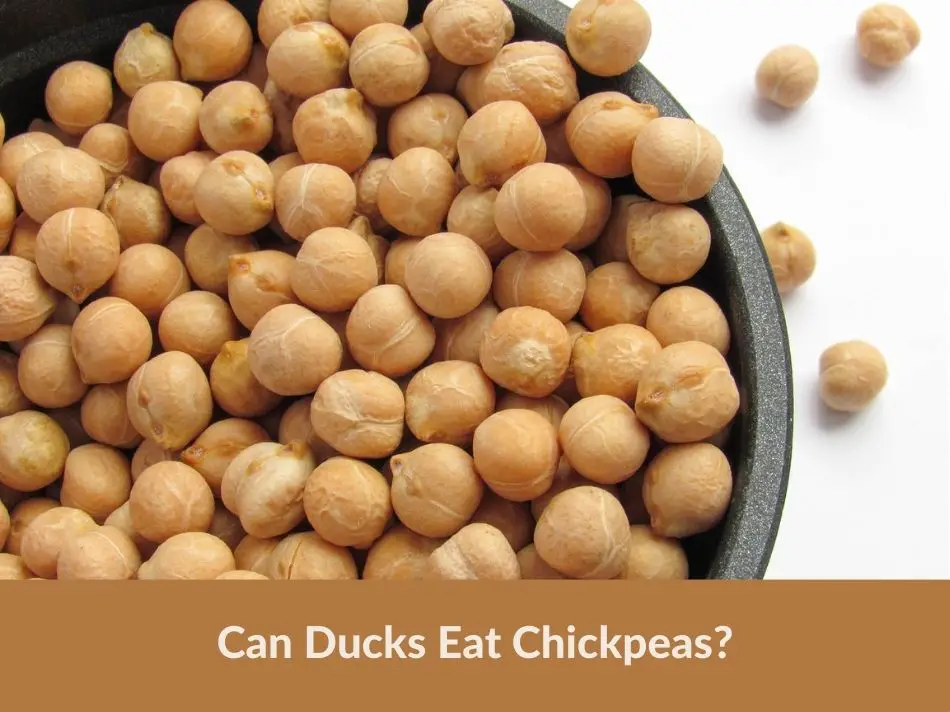Ducks are omnivorous creatures, which means they have a varied diet that includes both plants and animals. In the wild, they’ll often feast on a mix of aquatic plants, small fish, insects, and even crustaceans, while domestic ducks often gets pellets and mealworms. But, can ducks eat chickpeas?
Yes, ducks can eat cooked chickpeas. Chickpeas, also known as garbanzo beans, are a safe and nutritious treat for ducks when given in moderation. Raw chickpeas contains lectins, which are toxic to ducks. By cooking the chickpeas, the lectins will disappear and they will be safe for ducks to eat.
In this article, we delve into the dietary world of ducks, specifically focusing on chickpeas as a potential treat. From understanding a duck’s natural diet to the safe preparation of chickpeas to reduce lectin content, we guide caretakers and park visitors on how to offer this nutritious legume to ducks.
How Often Can I Feed My Ducks Chickpeas?
While chickpeas are nutritious, they shouldn’t make up the bulk of a duck’s diet. Think of them as a treat or supplement. It’s best to feed ducks chickpeas once or twice a week, ensuring they still get a balanced diet of their regular duck feed and natural forage.
Can Ducklings Eat Chickpeas?
Ducklings have different dietary needs compared to mature ducks. While cooked chickpeas aren’t harmful to ducklings, it’s essential to ensure they’re soft and easy for the little ones to digest. If you’re considering giving chickpeas to ducklings, it’s best to mash them up and mix them with their regular feed.
Chickpeas Nutritional Value
Below is the nutritional value of 100 grams of chickpeas.
- Calories: 164
- Protein: 8.9 g
- Fat: 2.6 g
- Total Carbohydrates: 27.4 g
- Dietary Fiber: 7.6 g
It also contains several vitamins and minerals as listed below.
- Manganese
- Folate (vitamin B9)
- Copper
- Iron
- Zinc
- Phosphorus
- Magnesium
- Thiamine
- Vitamin B6
- Selenium
- Potassium
Are Chickpeas Healthy for Ducks?
Chickpeas, often seen as a staple in human diets, can also offer a myriad of benefits for ducks. First and foremost, they provide a hearty source of protein. This protein ensures that ducks maintain strong muscles, aiding in their daily activities, whether it’s paddling in ponds or taking flight. A duck with a protein-rich diet will exhibit more vitality and energy.
Furthermore, chickpeas are a great source of dietary fiber. This fiber aids in digestion, ensuring that ducks maintain a healthy gut. A well-functioning digestive system is crucial for ducks to extract all the necessary nutrients from their food, keeping them in tip-top shape.
The natural carbohydrates found in chickpeas provide ducks with the energy they need to stay active throughout the day. Whether they’re foraging, swimming, or socializing with their flock, these carbs ensure they have the stamina to keep going.
Chickpeas can also contribute to a duck’s vibrant and glossy plumage. A well-nourished duck will not only feel good but will also look the part, with bright eyes and a shiny coat of feathers.
How To Feed Chickpeas To Ducks
Chickpeas, like many legumes, contain natural compounds called lectins, which is toxic to ducks. With the right preparation, you can reduce the lectin content and make chickpeas a safe treat for ducks. Here’s how:
- Soak Before Feeding: Soaking chickpeas overnight can help reduce their lectin content. This process softens the chickpeas and makes them easier to digest. Always discard the soaking water before the next step.
- Cook the Chickpeas: Cooking is an effective way to further reduce the lectin content. Boil the soaked chickpeas for at least 30 minutes to ensure they’re safe for duck consumption.
- Avoid Salt and Spices: When preparing chickpeas for ducks, ensure they’re free from salt, spices, or any additives. These can be harmful to ducks and should be avoided.
- Portion Control: Even with the reduced lectin content, chickpeas should be considered a treat. Offer them in moderation, with a handful being sufficient for a small group of ducks.
- Mash for Ducklings: If you’re feeding younger ducks, consider mashing the chickpeas. This makes it easier for them to consume and digest.
- Always Provide Water: Ducks need water to aid in digestion. Whenever you offer chickpeas or any other food, ensure ducks have access to clean water.
Other Berries Ducks Can Eat
From leafy greens to crunchy roots, these waterfowls can benefit from the vitamins and minerals found in many common garden veggies. Below are some more vegetables that ducks can safely enjoy.
Conclusion
Chickpeas can be a delightful treat for ducks when given in moderation. Caretakers and park visitors alike can offer these nutritious legumes to ducks. It is important that they are prepared first before feeding. Soaked and then cooked chickpeas are safe ducks.
Disclaimer: The information in this article is for informational purposes only. I'm not an expert or a veterinarian.


